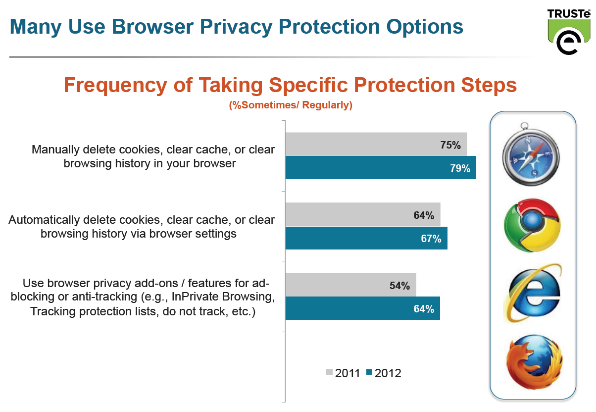A new survey by Truste claims 94 percent of people care deeply about online privacy. Unfortunately, none of them are in the online advertising industry. Tis the season for surveys. Last week I noted a survey by PwC about what personal data consumers are willing to give up, and what they want in return for it. The respondents to that survey were quite concerned about their privacy and understood their data had real monetary value.
 Today’s topic is another recent survey, this one commissioned by Truste, an organization that offers a Good Housekeeping-style seal of approval for corporate privacy practices. As with PwC, Truste’s survey suggests that consumer concern about online and mobile privacy is on the rise, and people are much more sophisticated about the issues than the ad industry might have you believe.
Today’s topic is another recent survey, this one commissioned by Truste, an organization that offers a Good Housekeeping-style seal of approval for corporate privacy practices. As with PwC, Truste’s survey suggests that consumer concern about online and mobile privacy is on the rise, and people are much more sophisticated about the issues than the ad industry might have you believe.
According to the survey, a whopping 94 percent of the 1000+ people surveyed consider privacy issues “really important” or “somewhat important,” and six out of ten are more concerned about it than they were a year ago.
More than a third claim they’ve stopped visiting a Web site or doing business with a company because they were concerned for their privacy, and 83 percent are aware of behavioral (ie, targeted) ads, up from 70 percent last year.
Admittedly, asking people questions like these often inspires them to answer in the way they think they’re supposed to, not necessarily in the way they actually act when not taking an online survey.
(“Do you floss after every single meal to ensure cleaner teeth and a whiter smile? Why, yes, I’m doing it right now.”)
For example: In this survey, 40 percent of people claim to read a Web site’s privacy policy often or most of the time. I think that number is off by a factor of ten. Even I don’t read privacy policies most of the time, and I do this for a living. Likewise for things like refusing to allow third parties to share information (76 percent) or opting out of online ads (50 percent). I suspect there’s a bit of self delusion at play here (though not as much as this guy seems to believe).
Still, because Truste asked the same questions last year, you can draw the conclusion that all the public debate over mobile privacy, GPS tracking, and Do Not Track legislation has had an impact. People are more aware of the issues, and they’re taking more steps to protect themselves. That’s all good, and I’ll happily take all the credit for it.

OK, maybe just some of the credit.
But wait, there are more interesting stats to be gleaned:
- 58 percent say they don’t like online behavioral advertising (ie, targeted ads)
- 53 percent believe their personal information is being shared with advertisers
- 58 percent say they’d rather only see ads from stores and brands they already do business with
- About 38 percent have warmer fuzzier feelings for targeted ads that come with a AdChoices icon they can click to get more info or opt out, though only 14 percent of those surveyed said they’d ever seen that icon before.
- Only 14 percent say they are OK with targeted ads if they can be assured their personally identifiable information is not being shared. The number of people who are OK with ads that glean personal info? A scant 2 percent.
As with the PwC survey results, this is not good news for an ad industry that desperately wants the FTC and Congress to leave them alone. People don’t trust the online ad industry, even if their notions about what information the industry collects aren’t especially accurate.
 I can’t say I feel much sympathy for these guys. Ad networks have shot themselves in their collective feet by acting like petulant children who are going to hold their breath until they get what they want. That no longer seems to be working.
I can’t say I feel much sympathy for these guys. Ad networks have shot themselves in their collective feet by acting like petulant children who are going to hold their breath until they get what they want. That no longer seems to be working.
Maybe it’s time to give up the pretense of “self regulation” and give the people what they want: worthwhile incentives for sharing their data, and an easy and complete way to opt out across all platforms. Is that too much to ask? Survey says, No.

No comments:
Post a Comment